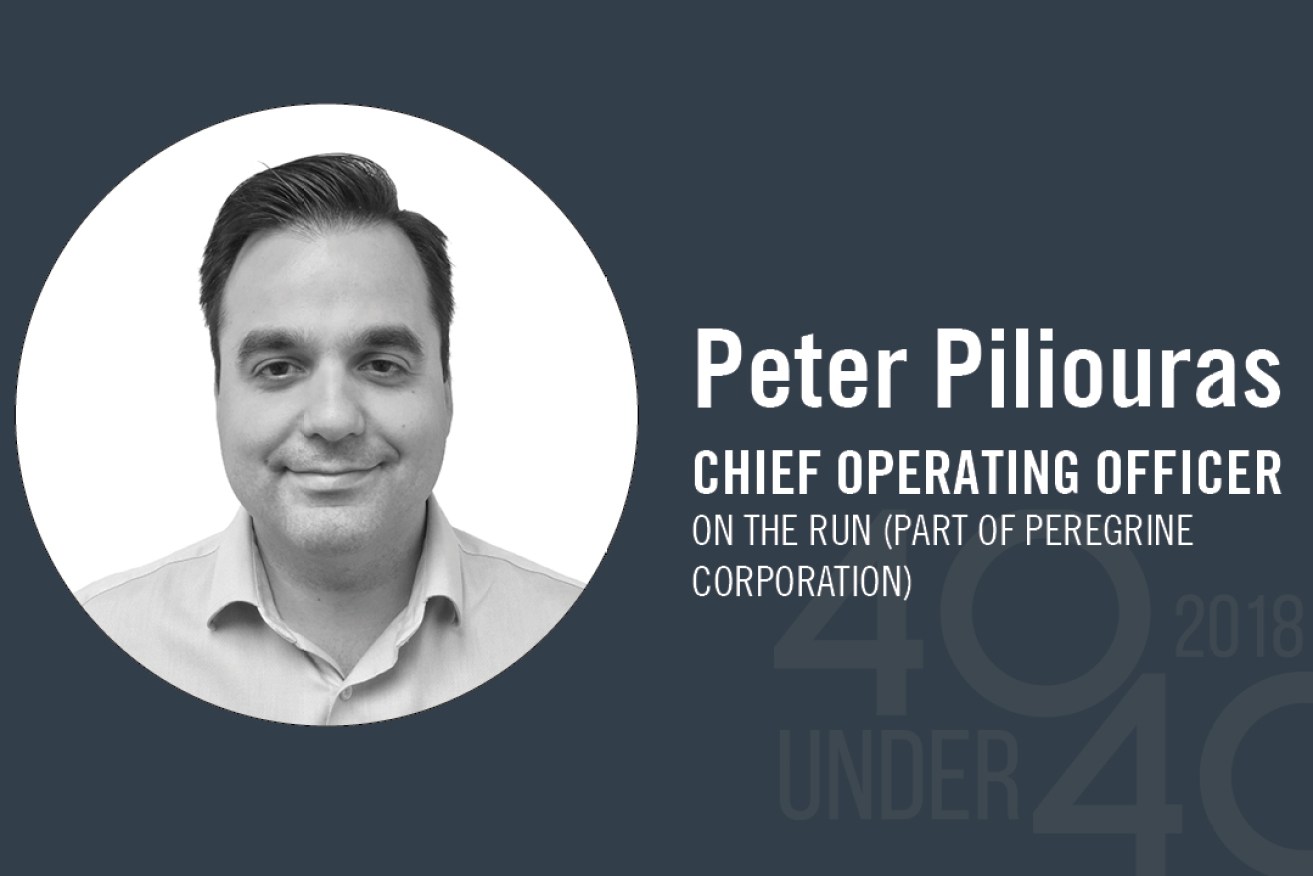40 Under 40 winner of the day: Peter Piliouras
Loyalty is paying dividends for Peter Piliouras. The 34-year-old has worked for Peregrine Corporation his entire professional career, joining the South Australian firm as company legal officer in 2006.

After serving as corporate services manager and assistant general manager, Piliouras in now chief operating officer of Peregrine’s flagship On The Run.
As Chief Operating Officer, Piliouras is second-in-command to the Executive Chairman Yasser Shahin and leads a team of more than 3000 staff in SA. He was named a winner of the inaugural InDaily 40 Under 40 Awards in June.
Peregrine is among the top 20 privately-owned companies in Australia and has 143 service stations/convenience stores, 51 Subway outlets, 12 Hungry Jacks restaurants, 12 Oporto restaurants, 9 Wok In A Box restaurants, 19 Brumby’s Bakeries, six Krispy Kreme stores and a Guzman y Gomez taqueria under the On The Run banner.
A graduate of Harvard Business School’s High Potentials Leadership Program in 2015, Piliouras also has degrees in Law and Commerce from the University of Adelaide.
We asked the former Pulteney Grammar Dux of School some more about doing business in South Australia.
What do you believe are the strengths of doing business in South Australia?
SA is a close-knit community: everyone wears their reputation on their sleeve. This makes it is a perfect environment to establish and foster mutually beneficial commercial relationships, which benefit South Australian businesses and keeps money in our local economy.
I truly believe that SA is the best place to raise a family in Australia meaning you can have your cake and eat it too – you can focus on your career and make quality time for family. This is an advantage that ultimately leads to happier and more productive employees and businesses.
Housing is affordable relative to interstate cities meaning young professionals in particular have the option of living closer to work. This, together with less traffic, means less transit time. Less transit time means more time for work, family and self.
Less transit time and geographic accessibility means more options – not just for parents choosing a school, but for consumers looking for goods or services. People will travel to businesses which distinguish themselves from others through quality/innovation. It is easier to stand out in SA than in Sydney or Melbourne.
Finally, SA has significant untapped potential. This means there will be plenty of growth opportunities for patient businesses who are willing to make their investment now.
What do you believe are the weak points of conducting business in South Australia?
A common observation is that SA is particularly conservative in the area of planning and development. Planning laws and their application needs balance, timeliness and consistency otherwise sensible investment is restricted and potentially discouraged.
SA has an aging working population – as reported on in various economic and demographic studies – which presents a future risk for our economy that is not being sufficiently addressed. In particular, there is a lack of significant investment in youth training places to encourage young workers to stay in Adelaide instead of fleeing interstate.
From a talent pool perspective it is difficult to find people willing to relocate from bigger cities to SA unless they have pre-existing roots in Adelaide. This is linked in part to a perception issue that SA still has despite its many changes in the last couple decades in particular.
Most head offices are interstate. Dealings with national companies means too regularly talking to someone interstate who does not know anything about your business.
Do you see your future in South Australia?
Certainly. SA has enormous potential which will lead to more opportunities in the future. It is the best place to raise a family and focus on career at the same time.
How can the state encourage more of its young leaders to stay?
Sponsorship of further education and development for young leaders either directly, or via incentives to employers. A great example of this is the incredible work done by the Industry Leaders Fund.
Universities could proactively engage with businesses to link degrees to graduate/internship programs which could lead to permanent positions and encourage interstate students to apply to SA universities.
Fix the VET sector so that employers are encouraged to put on trainees and apprentices. There is too much emphasis on promoting ‘higher’ education when we are facing a skills shortage in many areas.
Government as a large employer in SA has a role to play in ensuring there are positions in government which attract upcoming leaders.
More about 40 Under 40
An assessment panel representing the South Australian business community judged hundreds of nominees for the inaugural 40 Under 40 awards, which aim to identify and promote a new generation of local leaders under the age of 40.
The final 40 includes a hugely varied collection of South Australian talents, who are making a mark in fields such as health, technology, the media, property, social innovation, agriculture, finance, the law, and much more.
For the full list of 40 Under 40 winners go here.
40 Under 40 is an InDaily initiative supported by the following partners:
- Deloitte
- Piper Alderman
- Australian Institute of Business
- KWP!
- Australian Institute of Company Directors
- Underwood Executive
- City of Norwood, Payneham and St Peters
- Local Government Association of South Australia




